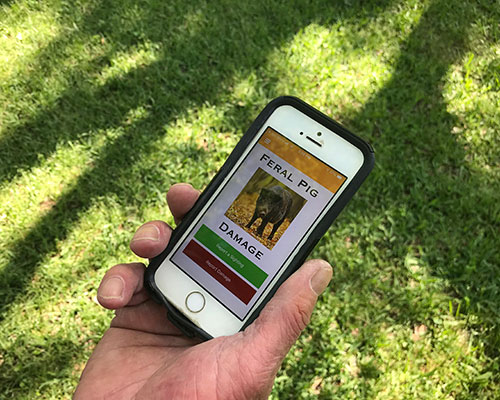Mississippi State develops smartphone app to assess wild hog damage

Farmers, landowners and homeowners can use MSU’s “Feral Pig Damage” app to better assess wild hog damage. The app is available for download for both Apple and Android devices. PHOTO: Karen Brasher | Agriculture and Natural Resources Marketing
According to a Mississippi State research study, feral pigs cause $66 million in property damage in the Magnolia State each year. With the wild hog population increases and damage estimates constantly changing, it’s now easier to report and assess impacts with a newly designed MSU app.
The “Feral Pig Damage” app makes it easy for users to report the location of wild hog sightings and the damage they cause. Users can pinpoint or draw a polygon on a specific location, upload photos, estimate economic loss and describe multiple attributes about the type of damage -- including crop type, whether it’s an agricultural, hardwood or pine area, as well as growth stage.
Mark McConnell, app developer and assistant professor in MSU’s Department of Wildlife, Fisheries and Aquaculture in the College of Forest Resources, said the app lets landowners, hunters and natural resource professionals quantify feral pig damage as soon as they encounter it and estimate the economic impact of that damage.
“The app gives anyone who observes wild hog damage the ability to quantify it both spatially and monetarily in real time,” said McConnell, who also is a scientist in the Mississippi Agricultural and Forestry Experiment Station. “Additionally, the mapping feature allows wildlife researchers to better understand the extent of wild hog damage in areas of which we may not be aware. This crucial information can help researchers and wildlife managers combat the spread and impact of feral pigs.”
St. John Family Endowed Professor of Wildlife Management Bronson Strickland said he hopes the app helps provide a more complete picture of the intensity and location of the damage in order to help refine economic estimates.
“The impetus for the app was the need for a consistent, systematic method for the quantification of feral pig damage,” Strickland said.
He pointed out that, in time, the app will generate a database of wild hog sightings and damage estimates that can be shared across multiple management organizations.
“This is an effort for all agencies, organizations and even individual agricultural producers that are impacted by feral pigs to quantify the damage, so wildlife researchers can determine where the greatest density of damage is occurring, and where new, emerging wild hog populations are found,” Strickland said. “The end result is to know where wild hog densities are greatest so that we can better manage those populations.”
Partners in the app’s development include the Mississippi Agricultural and Forestry Experiment Station, MSU Extension Service, the University of Georgia’s Warnell School of Forestry and Natural Resources, the Mississippi Department of Agriculture and Commerce, Mississippi Department of Wildlife, Fisheries and Parks, and the MSU Forest and Wildlife Research Center’s Center for Resolving Human-Wildlife Conflict.
The app is available for download in the Apple Store. Visit https://apps.apple.com/us/app/feral-pig-damage/id1265239102. Android download is available at https://play.google.com/store/apps/details?id=org.bugwood.feralpigdamage.
For more on MSU’s College of Forest Resources, visit www.cfr.msstate.edu. For more on wild pigs, visit wildpiginfo.msstate.edu.
MSU is Mississippi’s leading university, available online at www.msstate.edu.
Vanessa Beeson | Agriculture and Natural Resources Marketing



